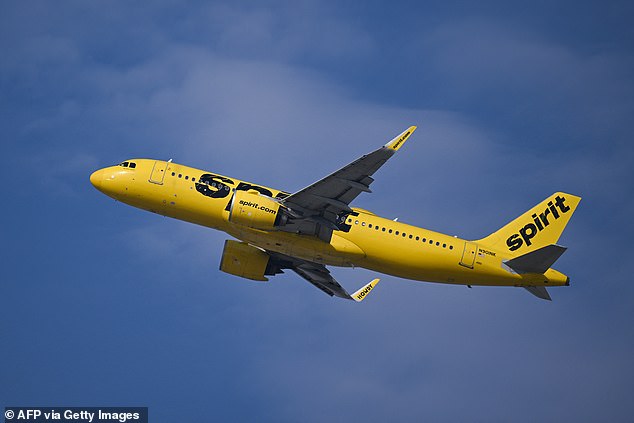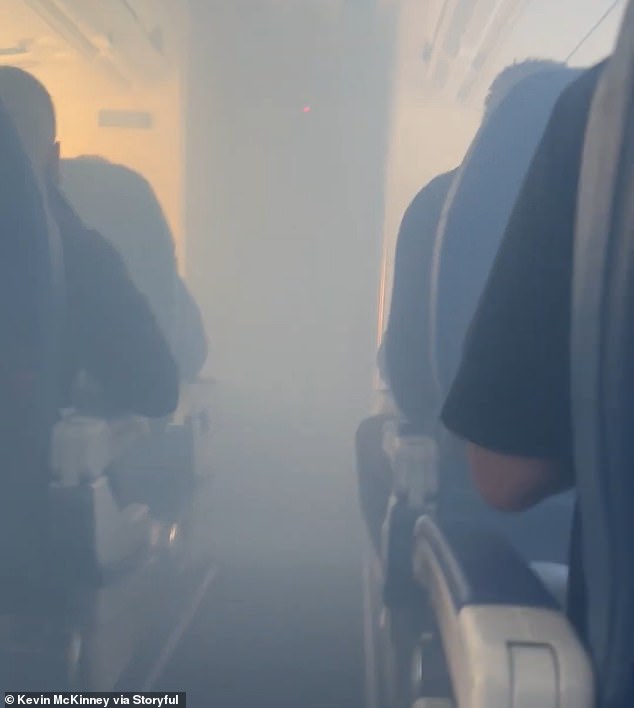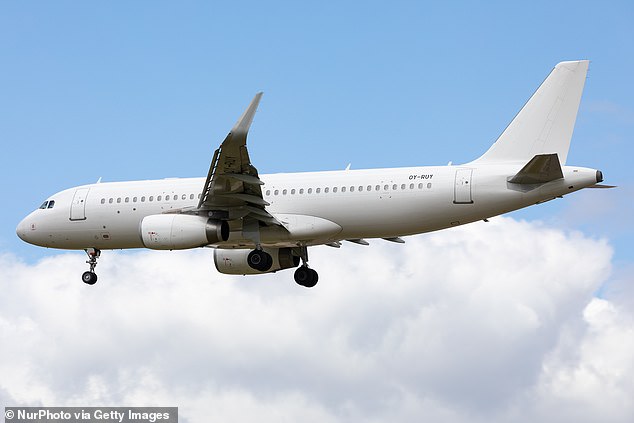A flight attendant has warned that a smell of burning tires could signal the presence of toxic fumes in an Airbus plane’s cabin that can cause brain injuries.
The former Spirit employee, who asked not to be identified, told the Daily Mail she experienced at least five ‘fume events’ during her 12-year career.
‘Usually it’s something you smell,’ she said. ‘It smells like burning tires or something like that… It’s almost like the exhaust fills up the cabin, and it can make you very, very sick.’
According to a Wall Street Journal report, a rise in jet fuel leaks on thousands of flights on the nation’s main airlines was found to cause symptoms similar to those of Chronic Traumatic Encephalopathy (CTE) normally found in NFL players after repeat head trauma.
The leaks are limited to Airbus A320 planes, which are used heavily by all major US airlines. Delta is currently in the process of quietly changing engines on more than 300 of its Airbus jets to tackle the issue.
Spirit, Frontier and JetBlue airlines all exclusively fly planes from the Airbus A320 family.
Delta, American and United Airlines operate fleets comprised of both Airbus and Boeing planes, with variants of the A320 used by all three.
The engine that can leak the toxic fumes is called the auxiliary power unit (APU). It usually sits at the tail of an aircraft, with its purpose to generate electricity and pump air into the plane when its two other engines are not running.

The former Spirit employee, who asked not to be identified, told the Daily Mail she experienced at least five ‘fume events’ during her 12-year career
The APU is often used while a plane is taxiing before takeoff and after landing.
Airbus and Honeywell – one of the two manufacturers of the APUs – are said to have jointly suggested turning off the APU’s air supply.
That leaves planes without air conditioning on the ground and could explain the exceptionally stuffy conditions some passengers face in Airbus A320 cabins while waiting to take off.
The flight attendant who spoke to the Daily Mail said that while the general public was unaware of this common issue on flights, those who work on planes are very familiar with it.
However, she said she was not given any training regarding leaks of toxins into the cabins and flight attendants are left to navigate the issue on their own.
She said the first time she experienced a leak, the captain explained to her that she would be fine as long as you get off the plane and it airs out.
‘The faster you get out, the better,’ the captain allegedly told her.
When she experienced a fume event in the air, with passengers aboard the plane, the pilot turned the aircraft around, but did not tell the passengers exactly why.
‘They said, you know, we have an issue and to be safe, we’re not going to [keep flying]… It’s just something has been happening forever. You know what I mean? It’s like getting a flat tire.’
This tracks with the Wall Street Journal’s reporting on issues with Delta.
The paper said that APU leaks have caused emergency diversions, abandoned takeoffs, pilots putting on oxygen masks and even a passenger vomiting.

Flight attendant Florence Chesson said she has been diagnosed with traumatic brain injury and damage to her nervous system after inhaling fumes leaked from the jet engine

Several JetBlue flights have been plagued by toxic fumes which have left several people on board with permanent brain injuries
The flight attendants reportedly understood the risk of being around engine fumes, regardless of whether they were told by an airline.
‘We all kind of know about it, which is the weird thing. That’s kind of the risk you take.
‘The airline that you’re working for is not gonna come out and tell you any of this. They do not admit it, that it exists. They don’t teach it in the class before you become a flight attendant. We are not supposed to say anything to the public.’
The former flight attendant noted that their working peers can refuse to fly if they don’t feel safe on the aircraft.
The Wall Street Journal reported that four JetBlue flight attendants had to be hospitalized after a September 2022 fume incident involving a single Airbus, according to a lawsuit.
Passengers were left nauseous, a child suffered a nosebleed and the same Airbus had to be diverted after a passenger aboard struggled to breathe, per the Journal.
The flight attendant said ‘fume events’ are usually invisible and only recognizable because of the smell. She added that based on the photographs she saw, a ‘fume event’ on a Delta flight in February must have been extremely bad because the cabin filled up with a haze, as shown in pictures.
Spirit told the Daily Mail in a statement: ‘The safety and well-being of our Guests and Team Members is always our top priority. We follow all FAA regulations and Airbus maintenance protocols regarding odor events, and we provide training, education and awareness in this area based on best practices from Airbus.’

A rise in jet fuel leaks on thousands of flights on the nation’s main airlines was found to cause CTE-like symptoms normally found in NFL players. The leaks are limited to Airbus A320 planes, which are used heavily by all major US airlines
The Daily Mail has reached out to Airbus for comment on the former flight attendant’s allegations, but has not heard back.
Airbus told the Journal that it was working with airlines and regulators to ensure ‘the best possible environment for passengers and crew.’
But the paper said Airbus had known of the issue as far back as 2001. It reported on Airbus staffers’ discussing a 2019 request from American Airlines for information on the root causes of APU leakages.
One staffer allegedly said: ‘Don’t officially give [American Airlines] the report because it identifies the airline and aircraft etc, and mentions APU load compressor seal oil leakage (back in 2003 !!)’
An Airbus probe found that 12 percent of fume incidents that took place on aircraft between 2016 and 2021 were linked to APU oil leaks.
The others were caused by the APU sucking in oil through an air inlet.
The plane manufacturer – which is headquartered in Toulouse, France – outlined three possible fixes.
The most radical proposed redesigning the APU, which could cut ‘smell’ events by 85 percent, according to Airbus.
Those redesigned APUs would only be added to new planes. Airbus suggested less radical changes to existing aircraft that would be less effective at combatting fumes.












